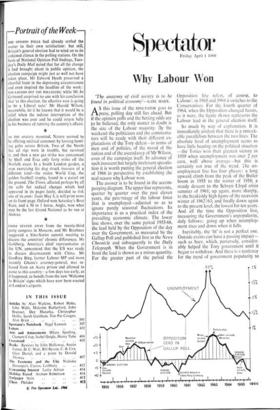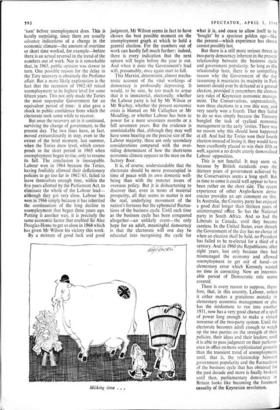Why Labour Won
'The anatomy of civil society is to be found in political economy'—KARL MARX.
AS this issue of the SPECTATOR goes to press, polling day still lies ahead. But if the opinion polls and the betting odds are ./.o be believed, the only matter in doubt is the size of the Labour majority. By the weekend the politicians and the commenta- tors will be ready with their different ex- planations of the Tory defeat—in terms of men and of policies, of the mood of the nation and of the ascendancy of Mr Wilson, even of the campaign itself. In advance of such innocent but largely irrelevant specula- tion it is worth putting the general election of 1966 in perspective by establishing the real reason why Labour won.
The answer is to be found in the accom- panying diagram. The upper line represents, quarter by quarter over the past eleven years, the percmtage of the labour force that is unemployed—adjusted so as to ignore purely seasonal fluctuations. Its importance is as a practical index of the prevailing economic climate. The lower line shows, over the same period 1955-66, the lead held by the Opposition of the day over the Government, as measured by the Gallup Poll and published first in the News Chronicle and subsequently in the Daily Telegraph. When the Government is in front the lead is shown as a minus quantity. For the greater part of the period the Opposition line refers, of course, to Labour : in 1965 and 1966 it switches to the Conservatives. For the fourth quarter of 1964, when the Opposition changed hands, as it were, the figure shown represents the Labour lead in the general election itself.
So much by way of explanation. It is immediately evident that there is a remark- able parallelism between the two lines. The absolute level of unemployment seems to have little bearing on the political situation —the Tories won their greatest victory in 1959 when unemployment was over 2 per cent, well above average—but this is certainly not true of the trend. The un- employment line has four phases : a long upward climb from the peak of the Butler boom in 1955 to the winter of 1958; a steady descent to the Selwyn Lloyd crisis summer of 1961; up again, more sharply, to the freakishly high figure of the recession winter of 1962 /63; and finally down again to the present level, the lowest for ten years. And all the time the Opposition line, measuring the Government's unpopularity, duly follows : going up when unemploy- ment rises and down when it falls.
Inevitably, the 'fit' is not a perfect one. Outside events can have a passing impact— such as Suez, which, perversely, consider- ably helped the Tory government until it began to withdraw. And there is a tendency for the trend of government popularity to 'turn' before unemployment does. This is hardly surprising, since there are usually advance indications of a change in the economic climate—the amount of overtime or short time worked, for example—before there is an actual reversal in the trend of the numbers out of work. Nor is it remarkable that, in 1963, public opinion was slower to turn. One possible reason for the delay in the Tory recovery is obviously the Profumo affair. But a more likely explanation is the fact that the recession of 1962 /63 raised unemployment to its highest level for some fifteen years. This not only made the Tories the most unpopular Government for an equivalent period of time : it also gave a shock to public confidence from which the electorate took some while to recover.
But once the recovery set in it continued, surviving the change of government, to the present day. The two lines have, in fact, moved extraordinarily in step, even to the extent of the brief moment, last summer, when the Tories drew level, which corres- ponds to the short period in 1965 when unemployment began to rise, only to resume its fall. The conclusion is inescapable. Labour won in 1964 because the Tories, having foolishly allowed their deflationary policies to go too far in 1962/63, failed to leave themselves enough time, within the five years allotted by the Parliament Act, to eliminate the whole of the Labour lead— although they got very close. Labour has won in 1966 simply because it has inherited the continuation of the long decline in unemployment that began three years ago. Putting it another way, it is precisely the same economic factor that enabled Sir Alec Douglas-Home to get so close in 1964 which has given Mr Wilson his victory this week.
By a mixture of good luck and good judgment, Mr Wilson seems in fact to have chosen the best possible moment on the unemployment graph at which to hold a general election. For the numbers out of work can hardly fall much further: indeed, there is every indication that the next upturn will begin before the year is out. And when it does the Government's lead will, presumably, once again start to fall.
This Marxist, determinist, almost mecha- nistic account of the vital workings of democracy is profoundly depressing. It would, to be sure, be too much to argue that it is immaterial, electorally, whether the Labour party is led by Mr Wilson or Mr Warbey, whether the present economic crisis is blamed on Mr Callaghan or Mr Maudling, or whether Labour has been in power for a mere seventeen months or a full seventeen years. But the evidence is unmistakable that, although they may well have some bearing on the precise size of the Labour majority, these are only secondary considerations compared with the over- riding determinant of how the short-term economic climate appears to the man on the factory floor.
It is, of course, understandable that the electorate should be more preoccupied in time of peace with its own domestic well- being than with the remoter issues of overseas policy. But it is disheartening to discover that, even in terms of material prosperity, all that seems to matter is not the real, underlying movement of the nation's fortunes but the ephemeral fluctua- tions of the business cycle. Until such time as the business cycle has been conquered altogether—an unlikely event—the only hope for an adult, meaningful democracy is that the electorate will one day be educated into recognising the cycle for Milking time . . . what it is, and cease to allow itself to be 'bought' by a spurious golden age—like the present—which experience has shown cannot possibly last.
But there is a still more serious threat to two-party democracy inherent in the present relationship between the business cycle and government popularity. So long as this relationship lasts, there is no compelling reason why the Government of the day (assuming it maintains its majority in Parl- iament) should ever be defeated at a general election, provided it remembers the elemen- tary rules of Keynesian economic manage- ment. The Conservatives, unprecedently, won three elections in a row this way, and very nearly won a fourth. That they failed to do so was simply because the Treasury bungled the task of cyclical economic management in the early 'sixties. There was no reason why this should have happened at all. And had the Tories won their fourth election instead of losing it, they would have been excellently placed to win their fifth as well, against a no doubt utterly demoralised Labour opposition.
This is not fanciful. It may seem so, because by British standards even the thirteen years of government achieved by the Conservatives seems a long spell. But in time to come it could well appear to have been rather on the short side. The recent experience of other Anglo-Saxon demo- cracies provides an apt comment on this. In Australia, the Country party has enjoyed a good deal longer than thirteen years of uninterrupted office. So has the National party in South Africa. And so had the Liberals in Canada, until they became careless. In the United States, even though the Government of the day has no choice of when an election shall be held, no President has failed to be re-elected for a third of a century. And in 1960 the Republicans, after eight years, lost only because they had mismanaged the economy and allowed unemployment to get out of hand—an elementary error which Kennedy wasted no time in correcting. Now an intermin- able period of Democratic rule seems assured.
There is every reason to suppose, there- fore, that, in this country, Labour, unless it either makes a gratuitous mistake in elementary economic management or else has the misfortune to run into another 1931, now has a very good chance of a spell of power long enough to make a virtual nonsense of the two-party system. Until the electorate becomes adult enough to weigh up the two parties on the strength of their policies, their ideas and their leaders; until it is able to pass judgment on their perform- ance in office on more sophisticated grounds than the transient trend of unemployment; until, that is, the relationship between government popularity and the fluctuations of the business cycle that has obtained for the past decade and more is finally broken; until then, parliamentary democracy in Britain looks like becoming the foremost casualty of the Keynesian revolution.



































 Previous page
Previous page